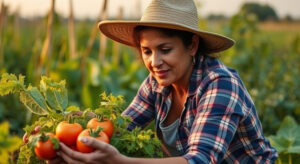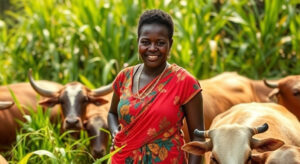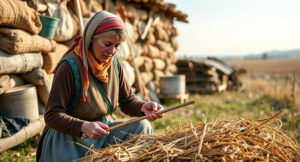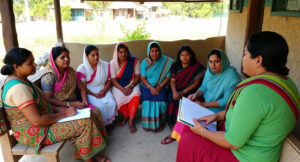A Tribute to the Pillars of Community Life
October 15 is International Rural Women’s Day. This day celebrates the vital role of rural women worldwide. Despite being overlooked in global discussions, these women are crucial to agriculture, food security, and resource management. They significantly contribute to the economic, social, and environmental development of their communities. As workers, household managers, and educators, rural women ensure food security and overall well-being. However, they are often marginalized. According to the FAO, women make up 40% of the agricultural workforce in developing countries.

Pillars of Agriculture and Food Security
In many parts of the world, rural women are at the heart of agricultural production. Not only do they grow, harvest, and process much of the food we eat every day, but they also play a crucial role in sustaining local economies. For example, in sub-Saharan Africa, they represent up to 60-80% of the agricultural workforce, ensuring not only the subsistence of their families but also the resilience of their communities.
Furthermore, they represent an important part of the agricultural workforce. In addition to their involvement in food production, they also play an active role in livestock breeding and the management of natural resources such as water and forests. In fact, according to the FAO, they contribute almost 50% of the world’s agricultural production.
Moreover, their work extends far beyond the fields. They are also involved in the storage, processing, and marketing of agricultural products, making an essential contribution to food and nutritional security worldwide.

Guardians of family and culture
In addition to their economic role, rural women are often the main heads of households. They ensure the well-being of their families by caring for children, managing food resources and ensuring the transmission of cultural traditions. They are at the heart of the preservation of the craft skills, customs and values that shape the identity of their communities.

Challenges and Obstacles
Despite their crucial role, rural women face many challenges. Their work is often unpaid or underpaid. They also have limited access to modern farming tools, credit, and land ownership. According to the FAO, if rural women had the same access to agricultural resources as men, production could increase by 20-30%. This would significantly reduce world hunger. Furthermore, they experience inequalities in education and health services, which limits their ability to improve their lives and their families’. Additionally, in many cultures, social norms and gender discrimination worsen these inequalities, making it harder for them to achieve economic and social independence.

A Step Towards Autonomy
Around the world, various initiatives are emerging to empower rural women. These efforts aim to provide the tools they need to thrive. Many projects focus on sustainable agriculture and entrepreneurship while offering access to microfinance. As a result, rural women can earn income, gain financial independence, and strengthen their leadership in their communities.
Moreover, empowering rural women involves improving their access to education and vocational training. By equipping them with technical and entrepreneurial skills, they become agents of change in their communities. Additionally, promoting their rights to land ownership and financial resources is essential. This enables them to fully develop their economic potential.
The power of Collective actions
On this day of celebration, it’s also important to highlight the power of the collective among rural women. Many of them organize themselves into cooperatives, enabling them to pool their resources and negotiate better working conditions and prices for their products. These collectives help to empower them and improve economic conditions for their families and communities.

Conclusion
International Rural Women’s Day reminds us that empowering rural women is not only a matter of social justice, but also a key factor in the fight against poverty and hunger worldwide. They represent the hope of a fairer, more sustainable future, where every woman, regardless of where she lives, has the opportunity to prosper and contribute fully to society. Rural development, food security and the sustainable management of natural resources depend largely on their contribution. To support them is to invest in the future of society as a whole.
Together, let us recognize their courage, their resilience, and their invaluable contribution. Let us support them in their efforts towards a more equitable and sustainable future.
References:
- https://www.un.org/en/observances/rural-women-day
- https://www.fao.org/rural-employment/rural-employmentwork-areas/rural-employmentwork-areaswomen-and-work/fr/
